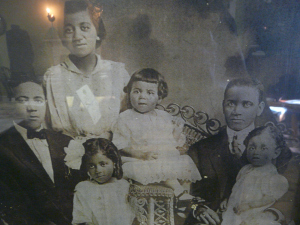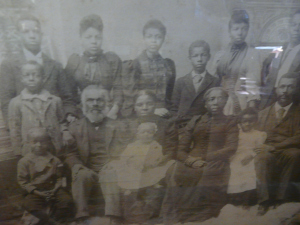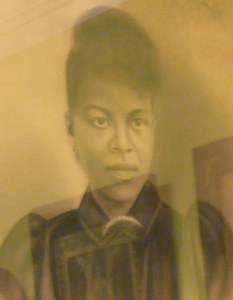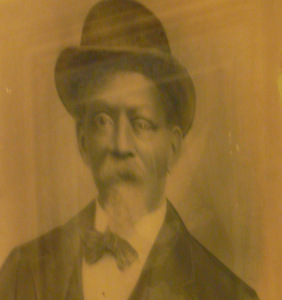September 12, 2009

Today was marvelous, and began auspiciously when I arrived at the Old City Cemetery in Lynchburg and Arthur materialized at my car door. He lives on top of a wicker coffin on the porch. He is a plump and happy cat and full of love and cuddles. He welcomed me to my first day of research at the Cemetery – an improbably happy place – a point of embarkation rather than termination, of celebration rather than of grief, of communion and connection rather than fear. I have rarely felt more welcome or at home. Presumably, by some of the fine faces in these pictures below, who were buried t/here.
As a public, primarily African and then African-American cemetery that also buried poor people, drifters, prostitutes, and other folks maligned and forgotten in the glories of decorated history, it was left in an abject and dejected state of ruin and decay for many decades until a remarkable group of people began wresting it back in the late 1990s – and ressussitating a gorgeous, deeply human 200-year saga that otherwise would have vanished forever.
 I’m spending a lot of time there because of research for the second draft and expansion of my novel KEROSENE – a book sprouted from the seeds of some fiercely sad and scandalous ancestral stories that took place in the Lynchburg area over a hundred years ago.
I’m spending a lot of time there because of research for the second draft and expansion of my novel KEROSENE – a book sprouted from the seeds of some fiercely sad and scandalous ancestral stories that took place in the Lynchburg area over a hundred years ago.
Never having been to Lynchburg, Virginia, I concocted and invoked the place from imagination and dreams, and childhood half-remembered gossip heard while hiding behind my grandmother’s dining room curtains.
For the four years I spent writing the first draft, I conjured and fabricated a fantasy Lynchburg of destitute but profoundly independent women: midwives and witches and brothel workers. A few good-looking railroad & tobacco men. Stories of miscegenation and murder and love affairs and births and suicides and dreams and destinies. My folks’ singularly misdirected quests for happiness became far more vivid and tangible to me than my real-time life. I vanished into dream-time effortlessly, and constantly.

When I arrived here for the Fellowship, I envisioned a few moonlit walks through the cow pastures, a few hours spent in writerly contemplation over the patterns of leaves on the ground, the scent of the fields in autumn, and maybe a glimpse of some evocative artifact (hat? baby carriage? speculum?) that would doubtless enrich the few polishing swipes I took at a second draft.
Instead, I took one look at the town as I crossed over the James River and realized that I was about to enter the book itself, and down the rabbit hole of my DNA. Like they had been waiting for my arrival in order to fully tell their tales, so I’d better sit back and witness.
Now, I’m well aware that the others with whom I share the sidewalk are perhaps experiencing 2009 Lynchburg with all its aspersions and stigmas and limitations (like any other place, but with its own specific maddening particulars). They are thinking about things involving electricity, for instance. But I’ve gone swimming back through time’s wormhole and found my ancestors here in dream-land.
 I’m also well aware that if my great-grandfather really did frequent Lynchburg’s bordellos, then I might be sharing the sidewalk with relatives. I feel almost entirely confident that I am. It makes it very peculiar to talk to folks I meet on the street. Everybody seems familiar. I have sympathy for them all. I wish them well, and hope they wish me well as well.
I’m also well aware that if my great-grandfather really did frequent Lynchburg’s bordellos, then I might be sharing the sidewalk with relatives. I feel almost entirely confident that I am. It makes it very peculiar to talk to folks I meet on the street. Everybody seems familiar. I have sympathy for them all. I wish them well, and hope they wish me well as well.
Yesterday, Greg (the archivist/curator at the Museum and today Ted (the archivist/curator at the Cemetery) set me up most generously and sunnily with a gorgeous stack of files (“the tip of the iceberg,” Ted winked) containing photographs and newspaper clippings and oral histories and census records of the midwives and prostitutes from my great-grandparents’ time. I sat amidst the brooches made of human hair, and went to work.
It’s humbling reading – so often I have to pause when I learn the unfathomable burdens these people bore – some of them identical to my people ..and how much more sense their ripples make as they flowed into my own upbringing, a century later. An object in motion tends to remain in motion, and I realize how much I have always felt these people’s currents within my own. Ah, DNA.
The lives of these people filled with constant, endemic injustices – not abstractly, but horrific tragedies casually documented by the all-knowing authoritative voice of the daily papers. The voice of history. Yet here they are, still wanting to be heard. I feel such responsibility towards them. I feel like it matters, where we come from as people, and what patterns get set in motion and must be understood in order to be redirected.
What shouldn’t be allowed to hide itself away out of shame or stigma. In particular, the lives of women. Everywhere. Always.
I read newspaper articles written by VMI and UVA men in the 1960s – the good thing about the sexual revolution was that they no longer had to pay for sex. But the bad thing was that they suddenly they had to deal with amateurs, and finance all the abortions themselves.
Ah, so it goes.
As for the part where my brain balances out its words with pictures and the logical goes away to sleep…
PHOTOGRAPHY!
I am also about to begin – on Sunday – a new photography project.
In the archives, I have been able to locate the street addresses for the bordello madams and home-hospital midwives that existed in town on the edges of the cemetery. Their homes are still standing (purchased and owned at a time when women were not allowed to own property in their own names. Usually unsegregated by race, unlike the rest of the South). I also have the stories of these women’s lives, and locations of their graves. It’s quite clear what will happen next…I will find a day with good light, and start following them.
It will certainly be a personal process of finding family, and of returning something to these women who lived so far into the land of the touched-untouchable. Who knows whether my great-grandfather lived in any of those houses – my hunch is that he did. Will he look out the windows, and see me with my camera, witnessing him, and pause just a moment to reconsider his course of action? If I had a message for the women? I will have to think about what message in a bottle I would send backwards in time.
